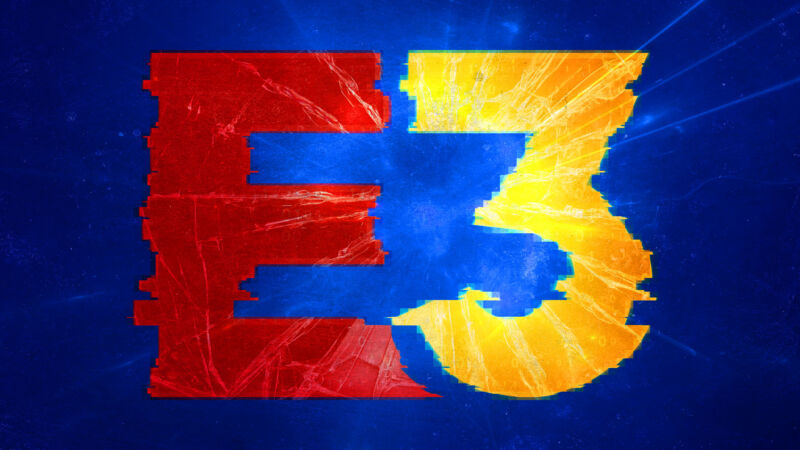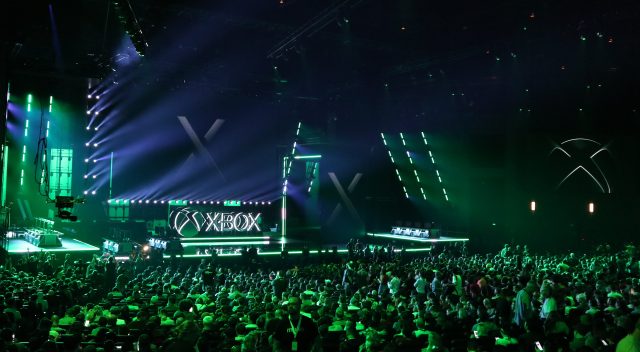Direct online marketing, distribution made an expensive annual show unnecessary.

Update (Dec. 12, 2023): After missing four years in a row due to COVID and waning industry interest, the Entertainment Software Association formally announced a permanent end to the Electronic Entertainment Expo today.
“After more than two decades of E3, each one bigger than the last, the time has come to say goodbye,” the organization wrote. “Thanks for the memories. GGWP.”
Despite today’s formal announcement, E3’s imminent demise has been apparent for a while, even before former organizer ReedPop parted ways with the ESA in September. Let this piece, originally written when the 2023 show was cancelled in March, serve as our epitaph for an annual industry gathering that grew to be a cultural touchstone in the gaming world.
This year’s edition of the Electronic Entertainment Expo (E3) has been canceled. The Entertainment Software Association (ESA) and show promoter ReedPop announced late Thursday that the planned June event—which was set to be the first in-person E3 since 2019—”did not garner the sustained interest necessary” from major publishers and potential attendees to justify a massive convention.
At this point, the cancellation of the 2023 show wasn’t a huge surprise. All three major console makers had already confirmed that they wouldn’t be attending, and major publishers Ubisoft and Sega publicly abandoned the show more recently. In an interview with GamesIndustry.biz, ESA president and CEO Stanley Pierre-Louis cited economic headwinds, digital marketing opportunities, and COVID-related game development timeline changes as reasons the companies backed out.
But the decades-long decline of E3 was also apparent well before this year’s problems—and even well before COVID forced the cancellation of the 2020 show (and every show in subsequent years). Part of me will miss the glitz and spectacle of the 15 E3s I’ve attended since 2004. But a larger part recognizes that E3 is a show that was built for a very different game industry and which has utterly failed to change with the times.
The console war’s premier battleground
Back before E3’s debut in 1995, a much smaller game industry than today’s dominated a significant chunk of Las Vegas’ sprawling Consumer Electronics Show. As the game industry grew, though, its major players decided that they needed a separate event to distinguish their business from the TV sets and music players cluttering the Las Vegas Convention Center every January.
The new game-focused show started with a bang when Sony executive Steve Race famously threw out his planned press conference speech about the then-upcoming PlayStation to deliver a single phrase: “Two hundred and ninety-nine dollars.” The price, which was $100 less than the stealth-launched Sega Saturn, practically settled that generation of the console wars before it had even started.Advertisement

This kind of jockeying for console supremacy—in front of throngs of eager media—was a central focus of E3 for decades afterward. At E3 2006, the early meme-ification of Sony’s PlayStation 3—complete with its “giant enemy crab” and “five hundred and ninety-nine US dollars” price—helped cement the system’s early reputation as overpriced and overcomplicated for developers.
By 2013’s show, though, Sony was the one with a PlayStation 4 that came in at $100 cheaper than the Kinect-powered Xbox One. Sony also used its E3 presentation that year to get in some savage digs at Microsoft, which was facing widespread controversy over its plans to restrict some used game sales on the Xbox One.
This kind of competitive bombast helped cement E3’s position as the place where the future of the console gaming market was hashed out. In the last decade, though, the major console makers seem to have realized that they didn’t need an expensive E3 booth or associated press conference to get their customers’ attention anymore.

FURTHER READING
So you think you want to go to E3…
When it came time to debut the Switch in 2017, Nintendo hosted its own January hands-on event in New York City rather than rushing out demos for E3 months earlier. Sony followed suit in 2019, dropping out of that year’s E3 and then the planned 2020 event (before COVID hit), despite the impending launch of the PlayStation 5. And while Microsoft still hosted a press conference and game demos adjacent to E3 in 2019, the company decided it didn’t actually need an expensive booth on the convention center floor.
Factory direct to you

Those E3 departures, and others from major publishers over the years, reflected the changing media landscape as much as anything else. In the early days of E3, the show was one of the most efficient ways for a publisher to get its major announcements and early preview builds in front of the magazine and website editors who still served as the most important way to get that information in front of an interested public.
As smartphones and high-speed Internet access became more popular, though, publishers increasingly found they could get much of the same effect with widely downloadable game demos and choreographed YouTube video presentations. Why pay to impress the media with an E3 press conference when a Nintendo Direct-style video stream can get as much media attention and reach your customers directly as well?
Sure, these purely digital promotions lacked some of the glitz and glamor of the ostentatious, console-war-driven E3 booths of the past. But everyday gamers only got to experience that glamor vicariously, anyway—the show only started offering limited public access in 2017. Meanwhile, the growth of fan-focused events like the Penny Arcade Expo and countless regional expos gave publishers large and small more direct (and cheaper) in-person access to their most devoted fans.Advertisement
Earned media aside, E3’s importance as a gathering place for business meetings has also eroded over the years. When brick-and-mortar retailers ruled the industry, a summer show was an important place for publishers to woo retail buyers with demos and hype ahead of the all-important holiday season releases. Those relationships and orders had to be established early to allow time for production and shipping to the stores that would make or break a publisher’s year.
Contrast that with today’s industry, where gamers tend to download games without ever leaving the house, and major titles can be released any time of the year—2022’s biggest release quickly sold 12 million copies after a February launch, after all. Just as the Internet blunted E3’s importance as a media show, this transition largely obviated the need for a business gathering as well.
By the time COVID hit in 2020, the writing was already on the wall for what was once the industry’s most important annual showcase. The show’s legacy branding helped it limp along for a while as an important place to be seen as a major industry player. But that bubble of earned self-importance was also remarkably easy to pierce once major publishers started examining what they were actually getting for the sizable expense of a show floor booth. Meanwhile, the much cheaper and more streamlined Summer Game Fest has swooped in to serve the segment of the business that still wants an in-person media showcase for early preview builds of upcoming games.
E3 was important because everyone was there, and everyone was there because E3 was important. Once some companies started using the Internet to get around that inherent value proposition, the question of whether E3 was still important became somewhat inevitable.




